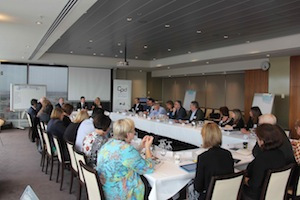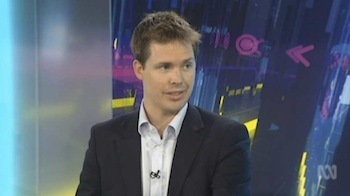Centre for Policy Development's Blog, page 47
April 7, 2015
Dunlop, writing for the SMH, considers the perils, promise of a low-carbon Australia | 7 April 2015
 Ian Dunlop, a contributing author to CPD’s publication More Than Luck: Ideas Australia, has recently considered Australia’s promise and lethargy as it faces the potential of transitioning to a low-carbon economy in response to climate change.
Ian Dunlop, a contributing author to CPD’s publication More Than Luck: Ideas Australia, has recently considered Australia’s promise and lethargy as it faces the potential of transitioning to a low-carbon economy in response to climate change.
Dunlop, in The Sydney Morning Herald piece, expresses wariness about the Australian government’s approach to a low-carbon economy: ‘Sensible climate policy has been dismantled … Climate change does not feature in the policy reviews underway … Every encouragement is given to new high-carbon investment.’
Similar circumspection is levelled against the business sector. ‘Even corporations and investment managers who profess leadership are unable to think much beyond incremental change from “business-as-usual”.’
But despite such concerns, he still considers grounds for optimism – noting the long-term policy requirements necessary for success.
‘Australia is well-placed to prosper in this new world with top quality renewable resources, and the expertise to develop them.’
‘But this requires policies which encourage science, innovation and rapid action, diametrically the opposite of the government’s ideological anti-science agenda that has decimated science funding at a time when it has never been more important.’
Dunlop finishes with some observations about who he considers better placed to effect change. ‘These changes will require unprecedented co-operation, and statesmanship of the highest order. It is too much to expect the male-dominated, eminence-grise of the incumbency to rise to the occasion, but women might.’

The post Dunlop, writing for the SMH, considers the perils, promise of a low-carbon Australia | 7 April 2015 appeared first on CPD.
March 25, 2015
High-Level Social Service Delivery Roundtable | 10 March 2015
 At the University of Melbourne on Tuesday 10th March, CPD hosted a high-level roundtable to explore some of the more challenging aspects of designing and implementing welfare services to assist vulnerable Australians.
At the University of Melbourne on Tuesday 10th March, CPD hosted a high-level roundtable to explore some of the more challenging aspects of designing and implementing welfare services to assist vulnerable Australians.
Roundtable attendees came from a wide range of academic institutions, community sector, public sector, peak bodies and service providers, including:
Ged Kearney (ACTU),
Professor Peter Shergold (University of Sydney),
Professor Gary Sturgess (ANZOG),
The Melbourne School of Government,
CPSU/SPSF,
ACOSS,
VCOSS
Boston Consulting Group,
Jobs Australia,
Job Futures,
The Able Movement,
National Disability Insurance Agency,
Numerous national charitable service providers, and
Departmental representatives from the federal and state levels.
The day-long event was kicked off by a dynamic and rousing keynote address on the big picture of social service delivery from former MP for Melbourne and federal Minister, Lindsay Tanner. The roundtable marks the next stage of research for the Effective Government program, with exciting projects to follow after the event.

The post High-Level Social Service Delivery Roundtable | 10 March 2015 appeared first on CPD.
March 18, 2015
Quiggin for The Guardian questions the relevance of the IGR | 5 March 2015
In a piece written for Guardian Australia, John Quiggin has questioned the purpose of the Intergenerational Report. Quiggin, a contributing author with The Centre for Policy Development, traces a range of historical intergenerational inequities and concludes that public policy in the 1980s and 1990s predominantly resolved several of these issues.
‘By the time the first IGR was released in 2002, the problem had already been largely resolved, and the remaining measures were generally anticipated,’ he writes.
Given changes such as the increases to the age of eligibility for retirement incomes, defined contribution schemes, and the reintroduction of income and assets tests, ‘there is no longer any serious issue of intergenerational equity facing Australia, except perhaps for the excessive tax subsidies for superannuation’. Quiggin suggests the report should be abandoned ‘once and for all’.

The post Quiggin for The Guardian questions the relevance of the IGR | 5 March 2015 appeared first on CPD.
March 17, 2015
McAuley fact-checks the health minister’s ‘doubled-in-a-decade’ spending comments | 11 March 2015
Ian McAuley, contributing author with the Centre for Policy Development, recently fact-checked Federal Health Minister Sussan Ley’s suggestion that Medicare spending has more than doubled in the last decade. The piece, which appeared in The Conversation and was written alongside Stephen Duckett, concluded that the health minister’s numbers are ‘broadly correct’, but the issue has been framed in a misleading manner.
The health minister’s suggestion that ‘the proportion of Medicare covered by the levy has fallen backwards from 67% to 54% in the last decade’ is ‘broadly correct'; so too are Ley’s figures for Medicare spending.
Yet, McAuley notes, the numbers ‘are framed in a way that overstates the impression of rising health care expenditure‘.
Further, ‘linking the Medicare levy to the cost of Medicare is questionable in policy terms. The Medicare levy was never meant to cover the entire cost of Medicare… The levy was a once-off political expedient 30 years ago. It is past its use-by date and ideally should be built into tax tables.’

The post McAuley fact-checks the health minister’s ‘doubled-in-a-decade’ spending comments | 11 March 2015 appeared first on CPD.
McAuley fact-checks the health minister’s ‘doubled-in-a-decade’ spending comments | 11th March 2015
Ian McAuley, contributing author with the Centre for Policy Development, recently fact-checked Federal Health Minister Sussan Ley’s suggestion that Medicare spending has more than doubled in the last decade. The piece, which appeared in The Conversation and was written alongside Stephen Duckett, concluded that the health minister’s numbers are ‘broadly correct’, but the issue has been framed in a misleading manner.
The health minister’s suggestion that ‘the proportion of Medicare covered by the levy has fallen backwards from 67% to 54% in the last decade’ is ‘broadly correct'; so too are Ley’s figures for Medicare spending.
Yet, McAuley notes, the numbers ‘are framed in a way that overstates the impression of rising health care expenditure‘.
Further, ‘linking the Medicare levy to the cost of Medicare is questionable in policy terms. The Medicare levy was never meant to cover the entire cost of Medicare… The levy was a once-off political expedient 30 years ago. It is past its use-by date and ideally should be built into tax tables.’

The post McAuley fact-checks the health minister’s ‘doubled-in-a-decade’ spending comments | 11th March 2015 appeared first on CPD.
March 14, 2015
Travers McLeod on The Drum talks ISIS, superannuation and homeopathy | 12 March 2015
 Travers McLeod, CEO of The Centre for Policy Development, recently appeared on ABC’s The Drum, tackling a range of issues: from Australia’s response to ISIS, to the place of superannuation in Australia’s fiscal future, to whether homeopathy should be subsidised.
Travers McLeod, CEO of The Centre for Policy Development, recently appeared on ABC’s The Drum, tackling a range of issues: from Australia’s response to ISIS, to the place of superannuation in Australia’s fiscal future, to whether homeopathy should be subsidised.
McLeod suggested that Australia’s response to ISIS needs more anthropologists and fewer military planners. Any effective approach to ISIS requires asking why people join, the engaging in the battle of ideas.
Meanwhile, McLeod suggested that raiding superannuation to pay for houses is a quick, unwise fix. He noted that superannuation is currently one of the only institutions in Australia functioning to ensure long-term fiscal sustainability.
Finally, he was asked whether homeopathy, in light of studies suggesting it has negligible medical benefit, should be subsidised. His answer: no. Instead, such funds should be spent on preventative health strategies and medical research and development.
The interview is still available on ABC iview.

The post Travers McLeod on The Drum talks ISIS, superannuation and homeopathy | 12 March 2015 appeared first on CPD.
February 23, 2015
Micro-parties reveal political system unfit for purpose: McLeod in The Conversation | 23 February 2015
 In a piece for The Conversation, Travers McLeod, CEO of the Centre for Policy Development, joins Mark Triffit, a Melbourne University Public Policy lecturer, in suggesting that the rise of micro-parties reveals a political system increasingly unfit for purpose.
In a piece for The Conversation, Travers McLeod, CEO of the Centre for Policy Development, joins Mark Triffit, a Melbourne University Public Policy lecturer, in suggesting that the rise of micro-parties reveals a political system increasingly unfit for purpose.
‘In a 21st-century internet-driven, globalised world, the array of political choices and identities available to voters are increasing and fragmenting,’ McLeod and Triffit observe in the article, which was also picked up by BusinessSpectator. ‘This reflects broader changes in a society in which choices – political, social or economic – are influenced by a widening collection of complex factors.’
Major parties are struggling to develop coherent narratives; while micro-parties gain from such ‘voter fragmentation‘. ‘With their single or limited issues campaigns [micro-parties] can cut through the political noise with more succinct appeals and arguments. They offer retail politics in a wholesale world.’ Micro-parties, rather than being an ‘unwelcome intrusion’, are in fact emblematic of ‘the way the 21st-century political world is being restructured’.
Current democratic systems are predicated on several organising principles that may no longer apply: functional majorities; efficient decision-making processes; and control over territorially constrained issues.
The piece suggests it is time to think about deeper reforms to our democracy, including the structure and function of political parties; the nature of electoral systems; and developing institutional changes that can steer good policy over the long term.

The post Micro-parties reveal political system unfit for purpose: McLeod in The Conversation | 23 February 2015 appeared first on CPD.
Hurley, in The Age, urges the IGR to be a broader compass for the 21st century | 23 February 2015
 In a piece for The Age, Sam Hurley, a Policy Analyst with the Centre for Policy Development, has suggested that the Intergenerational Report ‘is a perfect opportunity for the government to do something truly unprecedented: to frame a conversation about our intergenerational wellbeing and long-term policy priorities that is not tailored to the politics of now.’
In a piece for The Age, Sam Hurley, a Policy Analyst with the Centre for Policy Development, has suggested that the Intergenerational Report ‘is a perfect opportunity for the government to do something truly unprecedented: to frame a conversation about our intergenerational wellbeing and long-term policy priorities that is not tailored to the politics of now.’
His piece suggests the current dominant metrics (such as long-term demographic and fiscal trends), though certainly valuable, give us only a partial insight into what will underpin intergenerational wellbeing.
A decade ago we were world leaders in measuring wellbeing, he suggests. But the ABS Measures of Australia’s Progress has been de-funded, and the National Sustainability Council has been scrapped. ‘Meaningful discussion of the intergenerational impacts of climate change has been systematically purged from our political discourse,’ he writes.
A focus on the ‘debt and deficits’ narrative will equate neither to a near-term budget breakthrough nor better long-term policy outcomes. The discussion needs to broaden. It needs to include human, social and environmental capital as relevant factors.

The post Hurley, in The Age, urges the IGR to be a broader compass for the 21st century | 23 February 2015 appeared first on CPD.
Hurley, in The Age, urges for the IGR to be a broader compass for the 21st century | 23 February 2015
 In a piece for The Age, Sam Hurley, a Policy Analyst with the Centre for Policy Development, has suggested that the Intergenerational Report ‘is a perfect opportunity for the government to do something truly unprecedented: to frame a conversation about our intergenerational wellbeing and long-term policy priorities that is not tailored to the politics of now.’
In a piece for The Age, Sam Hurley, a Policy Analyst with the Centre for Policy Development, has suggested that the Intergenerational Report ‘is a perfect opportunity for the government to do something truly unprecedented: to frame a conversation about our intergenerational wellbeing and long-term policy priorities that is not tailored to the politics of now.’
His piece suggests the current dominant metrics (such as long-term demographic and fiscal trends), though certainly valuable, give us only a partial insight into what will underpin intergenerational wellbeing.
A decade ago we were world leaders in measuring wellbeing, he suggests. But the ABS Measures of Australia’s Progress has been de-funded, and the National Sustainability Council has been scrapped. ‘Meaningful discussion of the intergenerational impacts of climate change has been systematically purged from our political discourse,’ he writes.
A focus on the ‘debt and deficits’ narrative will equate neither to a near-term budget breakthrough nor better long-term policy outcomes. The discussion needs to broaden. It needs to include human, social and environmental capital as relevant factors.

The post Hurley, in The Age, urges for the IGR to be a broader compass for the 21st century | 23 February 2015 appeared first on CPD.
February 10, 2015
Quiggin writes in The Guardian about the electorate’s distrust for ‘reform’ | 10 February 2015
Professor John Quiggin, a contributing author with the Centre for Policy Development, has suggested the Australian electorate has grown distrustful of the word ‘reform’. In an opinion piece for The Guardian, Quiggin suggests that since the 1980s the idea of ‘reform’ has been tied to a tough-minded, micro-economic reconfiguration – one that often disregards opinions of the electorate. This was seen under the Hawke-Keating government, and then continued under Howard. The fruit of that agenda, Quiggin suggests, has since dried up.
“More than 30 years later, the term ‘reform’ still refers to the 1980s agenda“, Quiggin writes. “But everything worthwhile in that agenda was implemented decades ago. What is left are the dregs – policies like privatisation and individual employment contracts – that have failed to deliver improvements in living standards, and on which the Australian public has long since rendered its final, negative verdict.”
The piece concludes observing the importance of ‘reform’ turning its gaze to the “big issues of the 21st century“: climate change; the information economy; growing inequality; and the instability of the global financial system.
“What Australia needs now is a policy agenda focused on enabling Australians to take their place in an economy and society where universal access to knowledge and information is the key to prosperity.”

The post Quiggin writes in The Guardian about the electorate’s distrust for ‘reform’ | 10 February 2015 appeared first on CPD.
Centre for Policy Development's Blog
- Centre for Policy Development's profile
- 1 follower



